Entrepreneurship and Small Business Management Report - [Course Code]
VerifiedAdded on 2020/12/18
|15
|3895
|488
Report
AI Summary
This report provides a comprehensive overview of entrepreneurship and small business management. It begins by defining entrepreneurship and exploring different types of entrepreneurial ventures, including sole proprietorships, partnerships, and corporations, while also discussing the differences between scalable start-ups and small businesses. The report then examines the impact of small and micro businesses on the economy, including their contributions to innovation, job creation, and economic growth, as well as their importance to the local community. The report also contrasts serial entrepreneurs, intrapreneurs, and owner-managers. Finally, the report delves into the characteristics of successful entrepreneurs, such as creativity, passion, and optimism, and discusses the decision-making processes, attitude toward risk, and allocation of resources in both small and large enterprises. The report includes examples like Anita Roddick and Donald Trump to exemplify entrepreneurial success.

Entrepreneurship
and Small Business Management
and Small Business Management
Paraphrase This Document
Need a fresh take? Get an instant paraphrase of this document with our AI Paraphraser
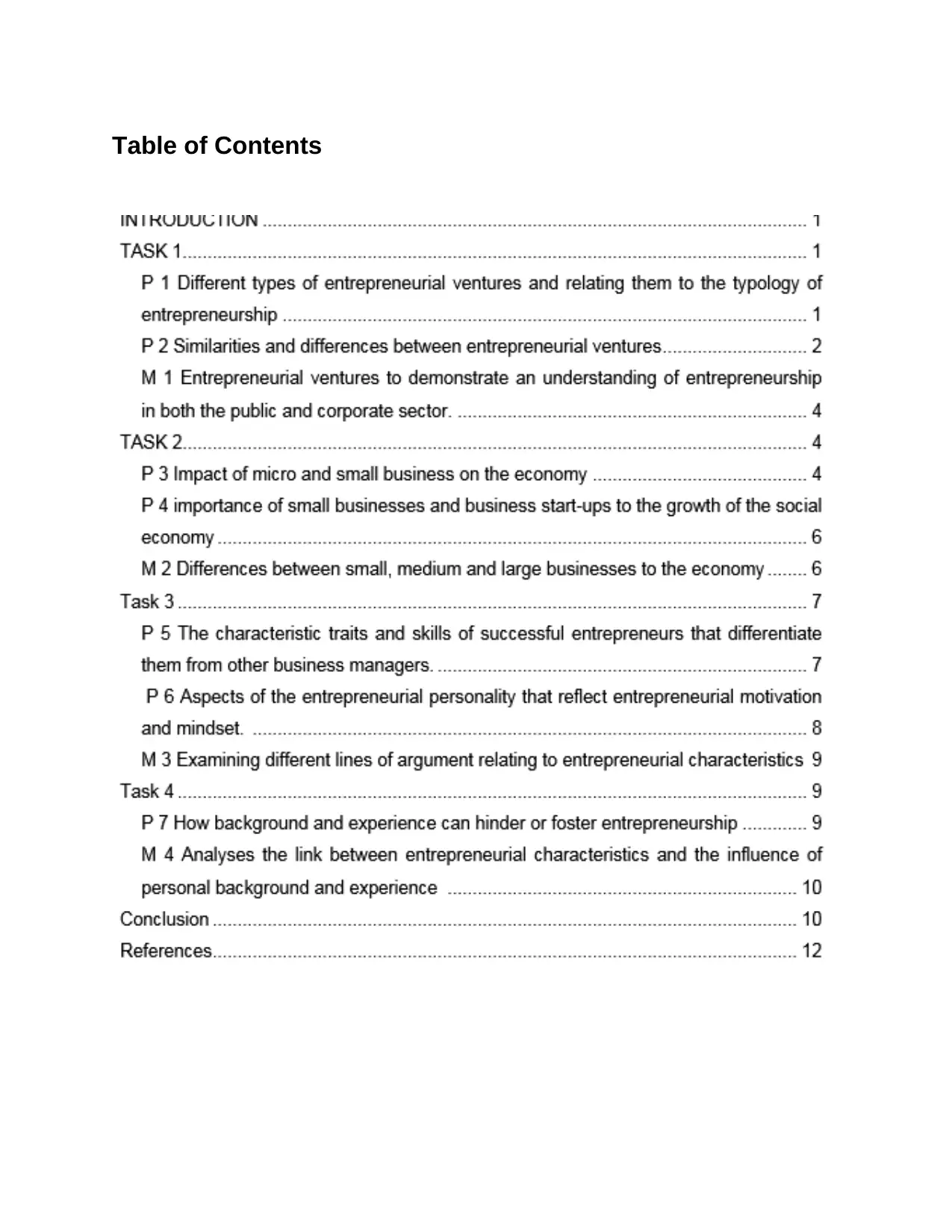
Table of Contents
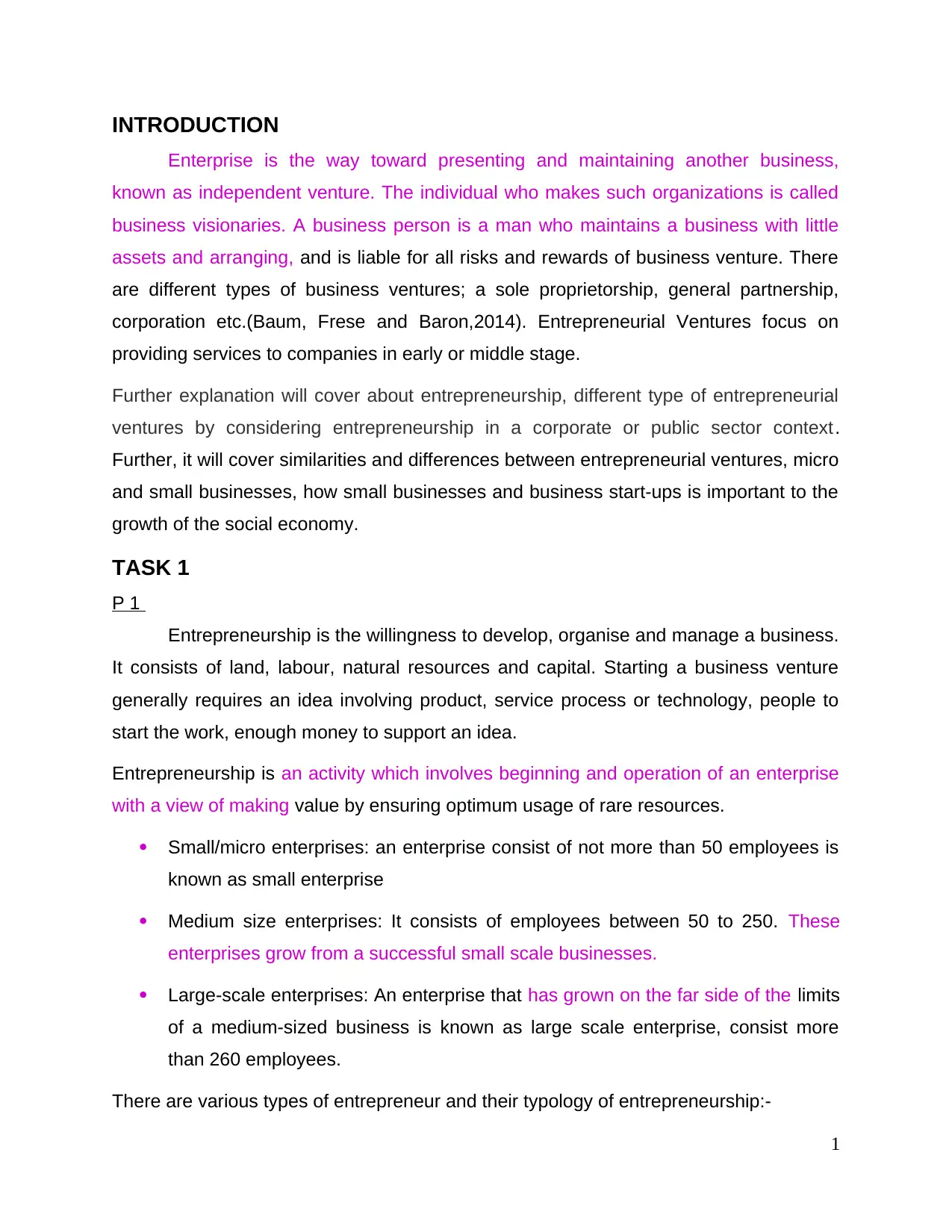
INTRODUCTION
Enterprise is the way toward presenting and maintaining another business,
known as independent venture. The individual who makes such organizations is called
business visionaries. A business person is a man who maintains a business with little
assets and arranging, and is liable for all risks and rewards of business venture. There
are different types of business ventures; a sole proprietorship, general partnership,
corporation etc.(Baum, Frese and Baron,2014). Entrepreneurial Ventures focus on
providing services to companies in early or middle stage.
Further explanation will cover about entrepreneurship, different type of entrepreneurial
ventures by considering entrepreneurship in a corporate or public sector context.
Further, it will cover similarities and differences between entrepreneurial ventures, micro
and small businesses, how small businesses and business start-ups is important to the
growth of the social economy.
TASK 1
P 1
Entrepreneurship is the willingness to develop, organise and manage a business.
It consists of land, labour, natural resources and capital. Starting a business venture
generally requires an idea involving product, service process or technology, people to
start the work, enough money to support an idea.
Entrepreneurship is an activity which involves beginning and operation of an enterprise
with a view of making value by ensuring optimum usage of rare resources.
Small/micro enterprises: an enterprise consist of not more than 50 employees is
known as small enterprise
Medium size enterprises: It consists of employees between 50 to 250. These
enterprises grow from a successful small scale businesses.
Large-scale enterprises: An enterprise that has grown on the far side of the limits
of a medium-sized business is known as large scale enterprise, consist more
than 260 employees.
There are various types of entrepreneur and their typology of entrepreneurship:-
1
Enterprise is the way toward presenting and maintaining another business,
known as independent venture. The individual who makes such organizations is called
business visionaries. A business person is a man who maintains a business with little
assets and arranging, and is liable for all risks and rewards of business venture. There
are different types of business ventures; a sole proprietorship, general partnership,
corporation etc.(Baum, Frese and Baron,2014). Entrepreneurial Ventures focus on
providing services to companies in early or middle stage.
Further explanation will cover about entrepreneurship, different type of entrepreneurial
ventures by considering entrepreneurship in a corporate or public sector context.
Further, it will cover similarities and differences between entrepreneurial ventures, micro
and small businesses, how small businesses and business start-ups is important to the
growth of the social economy.
TASK 1
P 1
Entrepreneurship is the willingness to develop, organise and manage a business.
It consists of land, labour, natural resources and capital. Starting a business venture
generally requires an idea involving product, service process or technology, people to
start the work, enough money to support an idea.
Entrepreneurship is an activity which involves beginning and operation of an enterprise
with a view of making value by ensuring optimum usage of rare resources.
Small/micro enterprises: an enterprise consist of not more than 50 employees is
known as small enterprise
Medium size enterprises: It consists of employees between 50 to 250. These
enterprises grow from a successful small scale businesses.
Large-scale enterprises: An enterprise that has grown on the far side of the limits
of a medium-sized business is known as large scale enterprise, consist more
than 260 employees.
There are various types of entrepreneur and their typology of entrepreneurship:-
1
⊘ This is a preview!⊘
Do you want full access?
Subscribe today to unlock all pages.

Trusted by 1+ million students worldwide
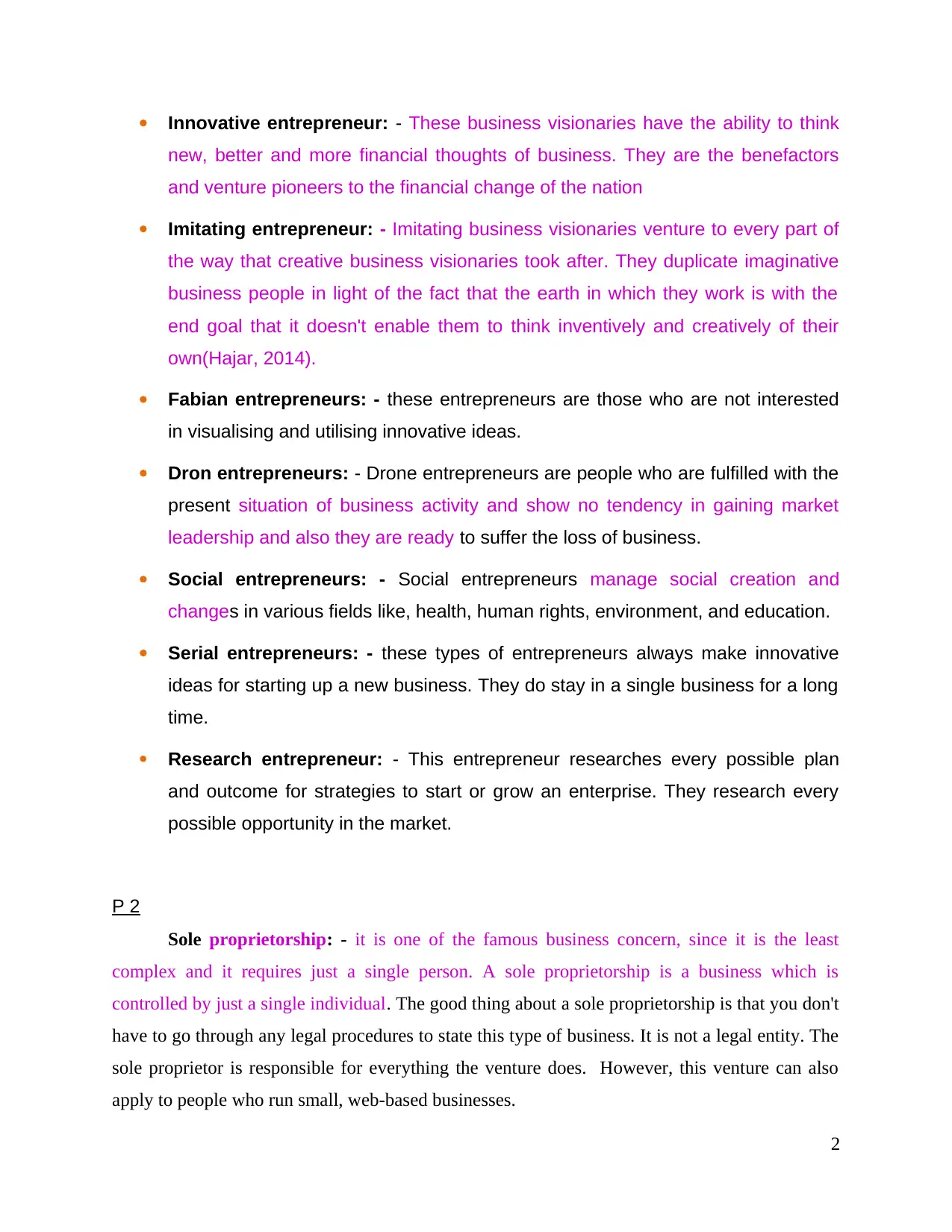
Innovative entrepreneur: - These business visionaries have the ability to think
new, better and more financial thoughts of business. They are the benefactors
and venture pioneers to the financial change of the nation
Imitating entrepreneur: - Imitating business visionaries venture to every part of
the way that creative business visionaries took after. They duplicate imaginative
business people in light of the fact that the earth in which they work is with the
end goal that it doesn't enable them to think inventively and creatively of their
own(Hajar, 2014).
Fabian entrepreneurs: - these entrepreneurs are those who are not interested
in visualising and utilising innovative ideas.
Dron entrepreneurs: - Drone entrepreneurs are people who are fulfilled with the
present situation of business activity and show no tendency in gaining market
leadership and also they are ready to suffer the loss of business.
Social entrepreneurs: - Social entrepreneurs manage social creation and
changes in various fields like, health, human rights, environment, and education.
Serial entrepreneurs: - these types of entrepreneurs always make innovative
ideas for starting up a new business. They do stay in a single business for a long
time.
Research entrepreneur: - This entrepreneur researches every possible plan
and outcome for strategies to start or grow an enterprise. They research every
possible opportunity in the market.
P 2
Sole proprietorship: - it is one of the famous business concern, since it is the least
complex and it requires just a single person. A sole proprietorship is a business which is
controlled by just a single individual. The good thing about a sole proprietorship is that you don't
have to go through any legal procedures to state this type of business. It is not a legal entity. The
sole proprietor is responsible for everything the venture does. However, this venture can also
apply to people who run small, web-based businesses.
2
new, better and more financial thoughts of business. They are the benefactors
and venture pioneers to the financial change of the nation
Imitating entrepreneur: - Imitating business visionaries venture to every part of
the way that creative business visionaries took after. They duplicate imaginative
business people in light of the fact that the earth in which they work is with the
end goal that it doesn't enable them to think inventively and creatively of their
own(Hajar, 2014).
Fabian entrepreneurs: - these entrepreneurs are those who are not interested
in visualising and utilising innovative ideas.
Dron entrepreneurs: - Drone entrepreneurs are people who are fulfilled with the
present situation of business activity and show no tendency in gaining market
leadership and also they are ready to suffer the loss of business.
Social entrepreneurs: - Social entrepreneurs manage social creation and
changes in various fields like, health, human rights, environment, and education.
Serial entrepreneurs: - these types of entrepreneurs always make innovative
ideas for starting up a new business. They do stay in a single business for a long
time.
Research entrepreneur: - This entrepreneur researches every possible plan
and outcome for strategies to start or grow an enterprise. They research every
possible opportunity in the market.
P 2
Sole proprietorship: - it is one of the famous business concern, since it is the least
complex and it requires just a single person. A sole proprietorship is a business which is
controlled by just a single individual. The good thing about a sole proprietorship is that you don't
have to go through any legal procedures to state this type of business. It is not a legal entity. The
sole proprietor is responsible for everything the venture does. However, this venture can also
apply to people who run small, web-based businesses.
2
Paraphrase This Document
Need a fresh take? Get an instant paraphrase of this document with our AI Paraphraser
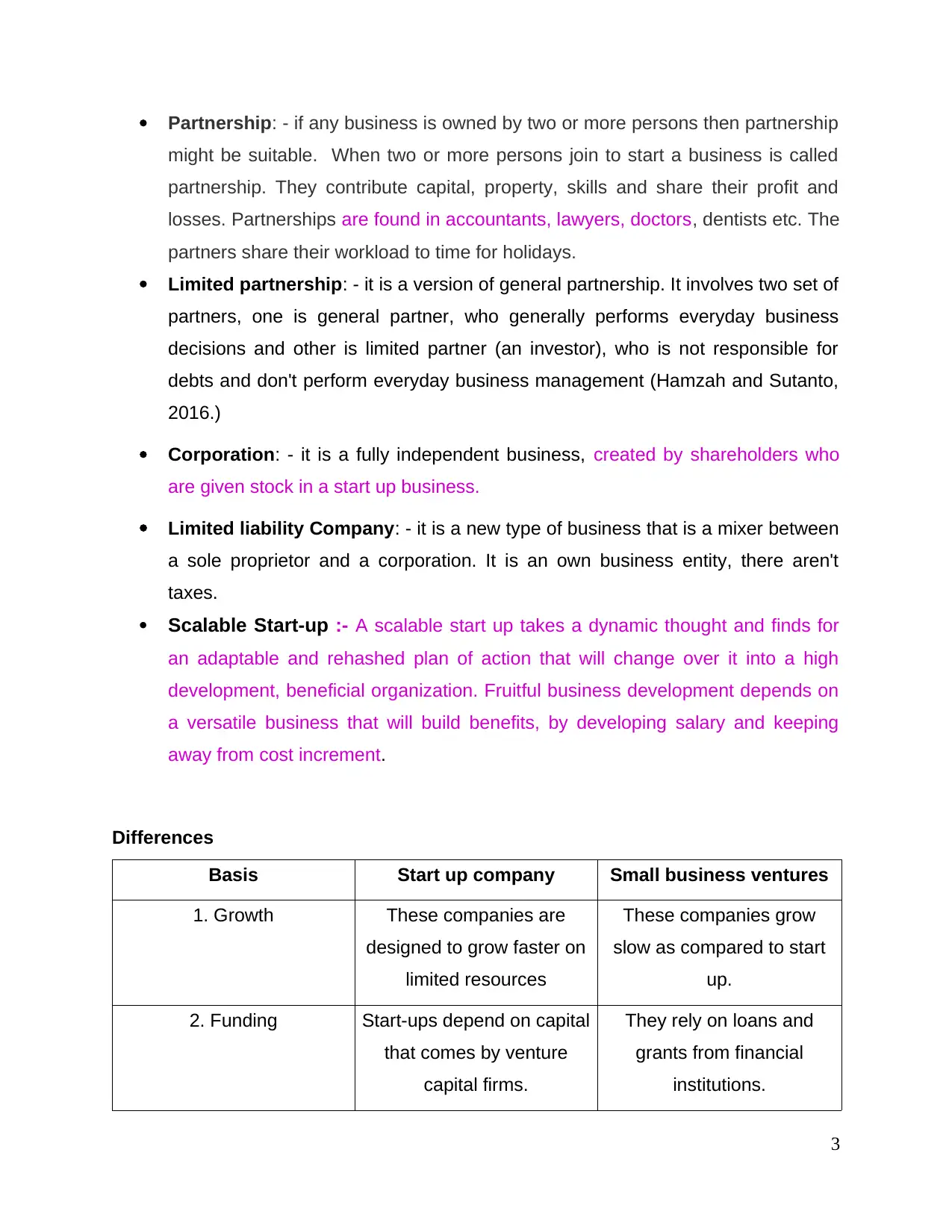
Partnership: - if any business is owned by two or more persons then partnership
might be suitable. When two or more persons join to start a business is called
partnership. They contribute capital, property, skills and share their profit and
losses. Partnerships are found in accountants, lawyers, doctors, dentists etc. The
partners share their workload to time for holidays.
Limited partnership: - it is a version of general partnership. It involves two set of
partners, one is general partner, who generally performs everyday business
decisions and other is limited partner (an investor), who is not responsible for
debts and don't perform everyday business management (Hamzah and Sutanto,
2016.)
Corporation: - it is a fully independent business, created by shareholders who
are given stock in a start up business.
Limited liability Company: - it is a new type of business that is a mixer between
a sole proprietor and a corporation. It is an own business entity, there aren't
taxes.
Scalable Start-up :- A scalable start up takes a dynamic thought and finds for
an adaptable and rehashed plan of action that will change over it into a high
development, beneficial organization. Fruitful business development depends on
a versatile business that will build benefits, by developing salary and keeping
away from cost increment.
Differences
Basis Start up company Small business ventures
1. Growth These companies are
designed to grow faster on
limited resources
These companies grow
slow as compared to start
up.
2. Funding Start-ups depend on capital
that comes by venture
capital firms.
They rely on loans and
grants from financial
institutions.
3
might be suitable. When two or more persons join to start a business is called
partnership. They contribute capital, property, skills and share their profit and
losses. Partnerships are found in accountants, lawyers, doctors, dentists etc. The
partners share their workload to time for holidays.
Limited partnership: - it is a version of general partnership. It involves two set of
partners, one is general partner, who generally performs everyday business
decisions and other is limited partner (an investor), who is not responsible for
debts and don't perform everyday business management (Hamzah and Sutanto,
2016.)
Corporation: - it is a fully independent business, created by shareholders who
are given stock in a start up business.
Limited liability Company: - it is a new type of business that is a mixer between
a sole proprietor and a corporation. It is an own business entity, there aren't
taxes.
Scalable Start-up :- A scalable start up takes a dynamic thought and finds for
an adaptable and rehashed plan of action that will change over it into a high
development, beneficial organization. Fruitful business development depends on
a versatile business that will build benefits, by developing salary and keeping
away from cost increment.
Differences
Basis Start up company Small business ventures
1. Growth These companies are
designed to grow faster on
limited resources
These companies grow
slow as compared to start
up.
2. Funding Start-ups depend on capital
that comes by venture
capital firms.
They rely on loans and
grants from financial
institutions.
3
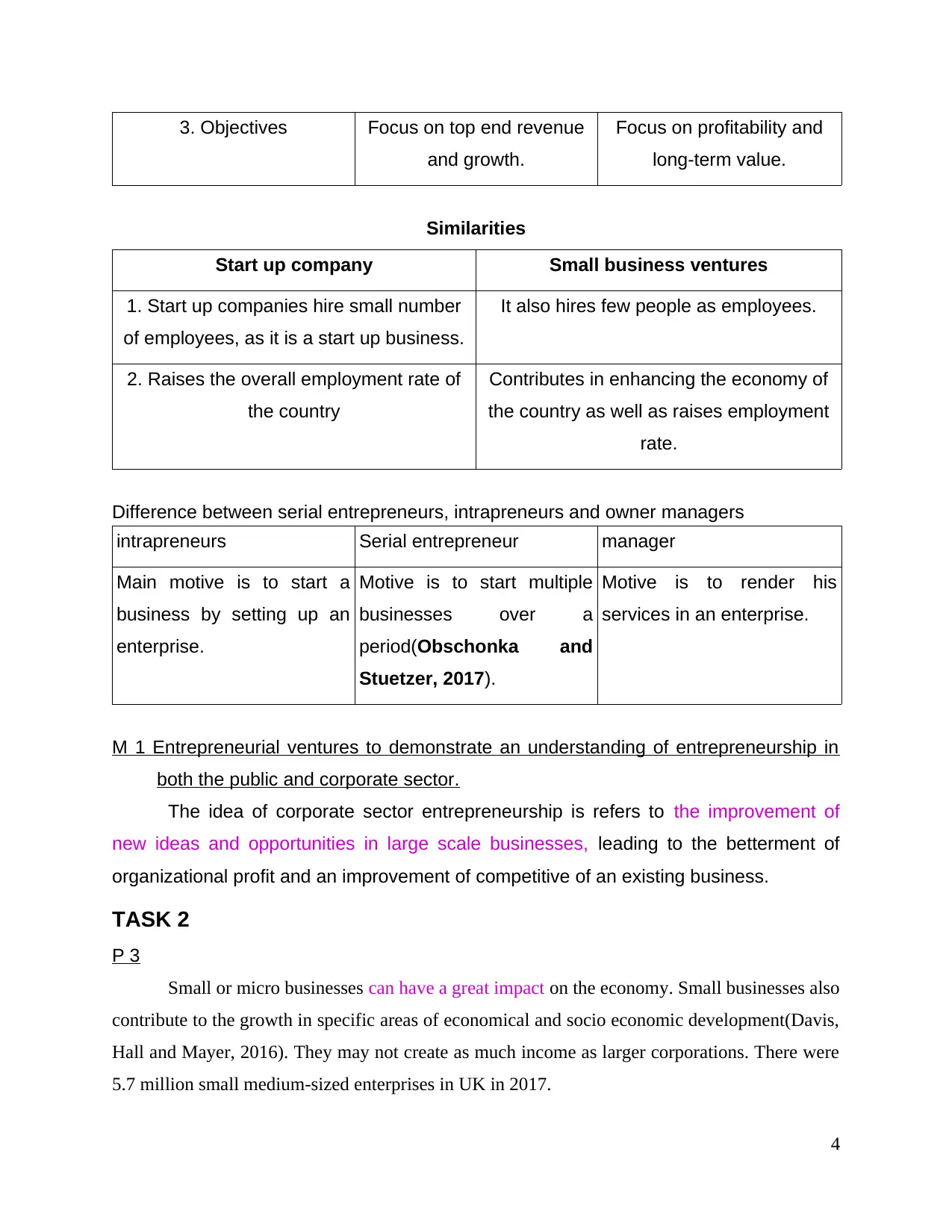
3. Objectives Focus on top end revenue
and growth.
Focus on profitability and
long-term value.
Similarities
Start up company Small business ventures
1. Start up companies hire small number
of employees, as it is a start up business.
It also hires few people as employees.
2. Raises the overall employment rate of
the country
Contributes in enhancing the economy of
the country as well as raises employment
rate.
Difference between serial entrepreneurs, intrapreneurs and owner managers
intrapreneurs Serial entrepreneur manager
Main motive is to start a
business by setting up an
enterprise.
Motive is to start multiple
businesses over a
period(Obschonka and
Stuetzer, 2017).
Motive is to render his
services in an enterprise.
M 1 Entrepreneurial ventures to demonstrate an understanding of entrepreneurship in
both the public and corporate sector.
The idea of corporate sector entrepreneurship is refers to the improvement of
new ideas and opportunities in large scale businesses, leading to the betterment of
organizational profit and an improvement of competitive of an existing business.
TASK 2
P 3
Small or micro businesses can have a great impact on the economy. Small businesses also
contribute to the growth in specific areas of economical and socio economic development(Davis,
Hall and Mayer, 2016). They may not create as much income as larger corporations. There were
5.7 million small medium-sized enterprises in UK in 2017.
4
and growth.
Focus on profitability and
long-term value.
Similarities
Start up company Small business ventures
1. Start up companies hire small number
of employees, as it is a start up business.
It also hires few people as employees.
2. Raises the overall employment rate of
the country
Contributes in enhancing the economy of
the country as well as raises employment
rate.
Difference between serial entrepreneurs, intrapreneurs and owner managers
intrapreneurs Serial entrepreneur manager
Main motive is to start a
business by setting up an
enterprise.
Motive is to start multiple
businesses over a
period(Obschonka and
Stuetzer, 2017).
Motive is to render his
services in an enterprise.
M 1 Entrepreneurial ventures to demonstrate an understanding of entrepreneurship in
both the public and corporate sector.
The idea of corporate sector entrepreneurship is refers to the improvement of
new ideas and opportunities in large scale businesses, leading to the betterment of
organizational profit and an improvement of competitive of an existing business.
TASK 2
P 3
Small or micro businesses can have a great impact on the economy. Small businesses also
contribute to the growth in specific areas of economical and socio economic development(Davis,
Hall and Mayer, 2016). They may not create as much income as larger corporations. There were
5.7 million small medium-sized enterprises in UK in 2017.
4
⊘ This is a preview!⊘
Do you want full access?
Subscribe today to unlock all pages.

Trusted by 1+ million students worldwide
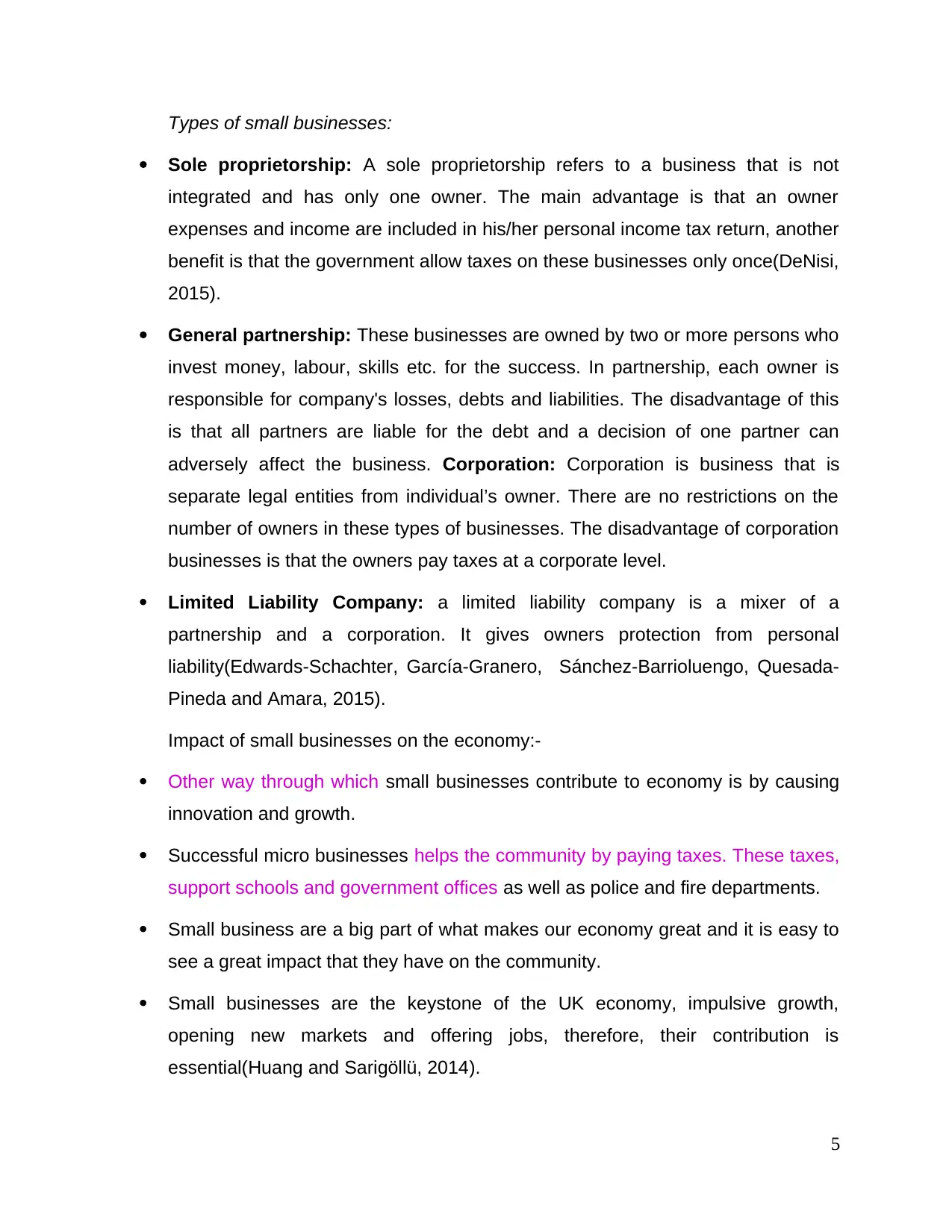
Types of small businesses:
Sole proprietorship: A sole proprietorship refers to a business that is not
integrated and has only one owner. The main advantage is that an owner
expenses and income are included in his/her personal income tax return, another
benefit is that the government allow taxes on these businesses only once(DeNisi,
2015).
General partnership: These businesses are owned by two or more persons who
invest money, labour, skills etc. for the success. In partnership, each owner is
responsible for company's losses, debts and liabilities. The disadvantage of this
is that all partners are liable for the debt and a decision of one partner can
adversely affect the business. Corporation: Corporation is business that is
separate legal entities from individual’s owner. There are no restrictions on the
number of owners in these types of businesses. The disadvantage of corporation
businesses is that the owners pay taxes at a corporate level.
Limited Liability Company: a limited liability company is a mixer of a
partnership and a corporation. It gives owners protection from personal
liability(Edwards-Schachter, García-Granero, Sánchez-Barrioluengo, Quesada-
Pineda and Amara, 2015).
Impact of small businesses on the economy:-
Other way through which small businesses contribute to economy is by causing
innovation and growth.
Successful micro businesses helps the community by paying taxes. These taxes,
support schools and government offices as well as police and fire departments.
Small business are a big part of what makes our economy great and it is easy to
see a great impact that they have on the community.
Small businesses are the keystone of the UK economy, impulsive growth,
opening new markets and offering jobs, therefore, their contribution is
essential(Huang and Sarigöllü, 2014).
5
Sole proprietorship: A sole proprietorship refers to a business that is not
integrated and has only one owner. The main advantage is that an owner
expenses and income are included in his/her personal income tax return, another
benefit is that the government allow taxes on these businesses only once(DeNisi,
2015).
General partnership: These businesses are owned by two or more persons who
invest money, labour, skills etc. for the success. In partnership, each owner is
responsible for company's losses, debts and liabilities. The disadvantage of this
is that all partners are liable for the debt and a decision of one partner can
adversely affect the business. Corporation: Corporation is business that is
separate legal entities from individual’s owner. There are no restrictions on the
number of owners in these types of businesses. The disadvantage of corporation
businesses is that the owners pay taxes at a corporate level.
Limited Liability Company: a limited liability company is a mixer of a
partnership and a corporation. It gives owners protection from personal
liability(Edwards-Schachter, García-Granero, Sánchez-Barrioluengo, Quesada-
Pineda and Amara, 2015).
Impact of small businesses on the economy:-
Other way through which small businesses contribute to economy is by causing
innovation and growth.
Successful micro businesses helps the community by paying taxes. These taxes,
support schools and government offices as well as police and fire departments.
Small business are a big part of what makes our economy great and it is easy to
see a great impact that they have on the community.
Small businesses are the keystone of the UK economy, impulsive growth,
opening new markets and offering jobs, therefore, their contribution is
essential(Huang and Sarigöllü, 2014).
5
Paraphrase This Document
Need a fresh take? Get an instant paraphrase of this document with our AI Paraphraser
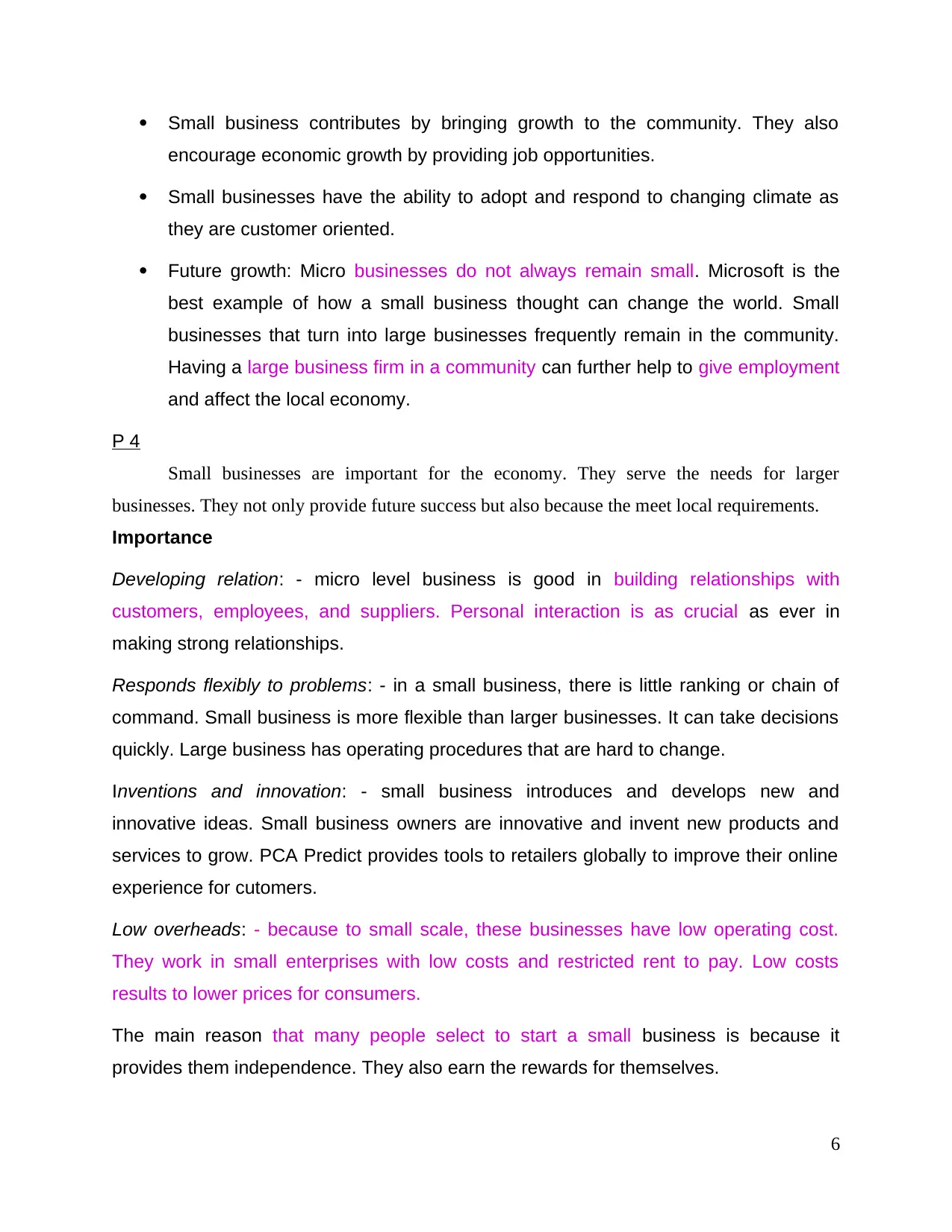
Small business contributes by bringing growth to the community. They also
encourage economic growth by providing job opportunities.
Small businesses have the ability to adopt and respond to changing climate as
they are customer oriented.
Future growth: Micro businesses do not always remain small. Microsoft is the
best example of how a small business thought can change the world. Small
businesses that turn into large businesses frequently remain in the community.
Having a large business firm in a community can further help to give employment
and affect the local economy.
P 4
Small businesses are important for the economy. They serve the needs for larger
businesses. They not only provide future success but also because the meet local requirements.
Importance
Developing relation: - micro level business is good in building relationships with
customers, employees, and suppliers. Personal interaction is as crucial as ever in
making strong relationships.
Responds flexibly to problems: - in a small business, there is little ranking or chain of
command. Small business is more flexible than larger businesses. It can take decisions
quickly. Large business has operating procedures that are hard to change.
Inventions and innovation: - small business introduces and develops new and
innovative ideas. Small business owners are innovative and invent new products and
services to grow. PCA Predict provides tools to retailers globally to improve their online
experience for cutomers.
Low overheads: - because to small scale, these businesses have low operating cost.
They work in small enterprises with low costs and restricted rent to pay. Low costs
results to lower prices for consumers.
The main reason that many people select to start a small business is because it
provides them independence. They also earn the rewards for themselves.
6
encourage economic growth by providing job opportunities.
Small businesses have the ability to adopt and respond to changing climate as
they are customer oriented.
Future growth: Micro businesses do not always remain small. Microsoft is the
best example of how a small business thought can change the world. Small
businesses that turn into large businesses frequently remain in the community.
Having a large business firm in a community can further help to give employment
and affect the local economy.
P 4
Small businesses are important for the economy. They serve the needs for larger
businesses. They not only provide future success but also because the meet local requirements.
Importance
Developing relation: - micro level business is good in building relationships with
customers, employees, and suppliers. Personal interaction is as crucial as ever in
making strong relationships.
Responds flexibly to problems: - in a small business, there is little ranking or chain of
command. Small business is more flexible than larger businesses. It can take decisions
quickly. Large business has operating procedures that are hard to change.
Inventions and innovation: - small business introduces and develops new and
innovative ideas. Small business owners are innovative and invent new products and
services to grow. PCA Predict provides tools to retailers globally to improve their online
experience for cutomers.
Low overheads: - because to small scale, these businesses have low operating cost.
They work in small enterprises with low costs and restricted rent to pay. Low costs
results to lower prices for consumers.
The main reason that many people select to start a small business is because it
provides them independence. They also earn the rewards for themselves.
6
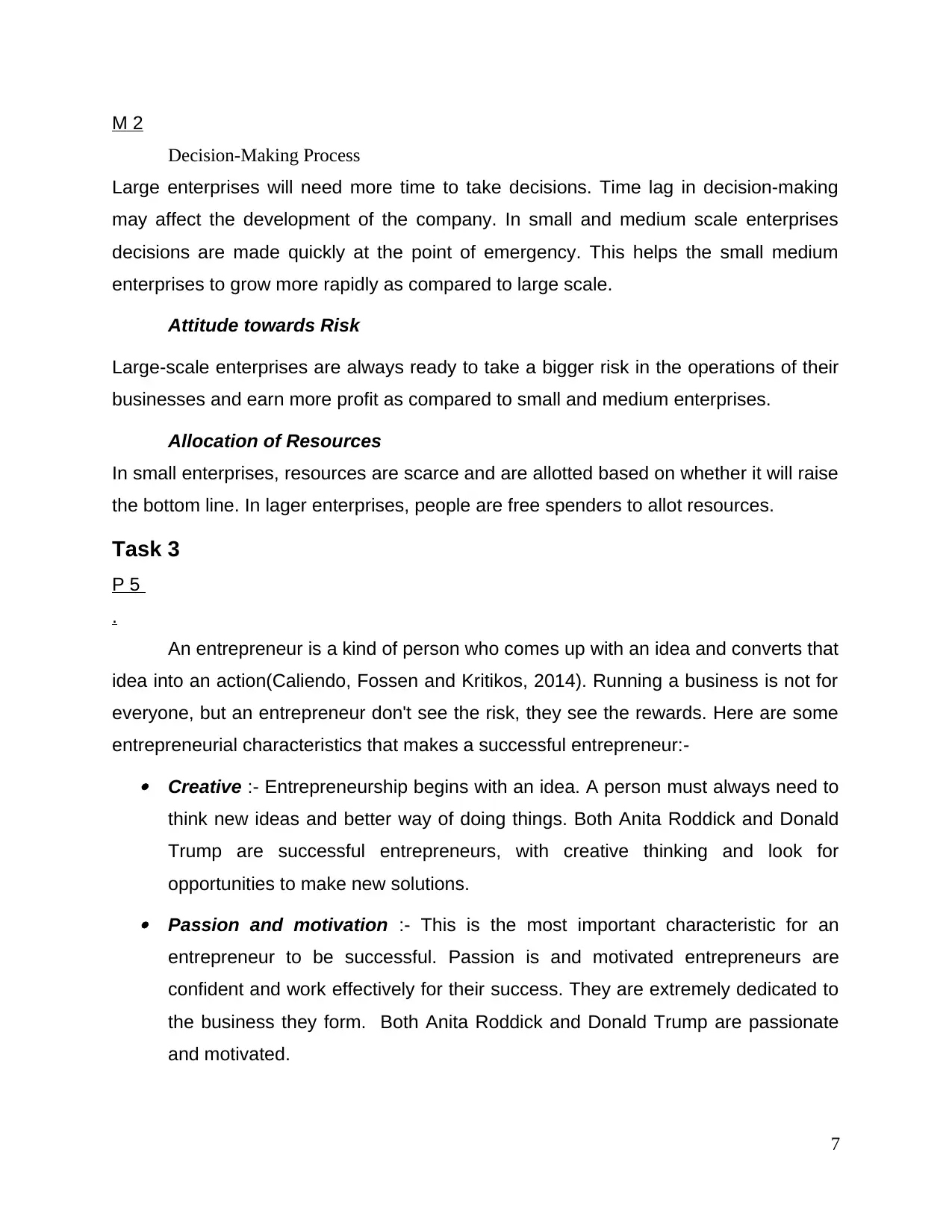
M 2
Decision-Making Process
Large enterprises will need more time to take decisions. Time lag in decision-making
may affect the development of the company. In small and medium scale enterprises
decisions are made quickly at the point of emergency. This helps the small medium
enterprises to grow more rapidly as compared to large scale.
Attitude towards Risk
Large-scale enterprises are always ready to take a bigger risk in the operations of their
businesses and earn more profit as compared to small and medium enterprises.
Allocation of Resources
In small enterprises, resources are scarce and are allotted based on whether it will raise
the bottom line. In lager enterprises, people are free spenders to allot resources.
Task 3
P 5
.
An entrepreneur is a kind of person who comes up with an idea and converts that
idea into an action(Caliendo, Fossen and Kritikos, 2014). Running a business is not for
everyone, but an entrepreneur don't see the risk, they see the rewards. Here are some
entrepreneurial characteristics that makes a successful entrepreneur:- Creative :- Entrepreneurship begins with an idea. A person must always need to
think new ideas and better way of doing things. Both Anita Roddick and Donald
Trump are successful entrepreneurs, with creative thinking and look for
opportunities to make new solutions. Passion and motivation :- This is the most important characteristic for an
entrepreneur to be successful. Passion is and motivated entrepreneurs are
confident and work effectively for their success. They are extremely dedicated to
the business they form. Both Anita Roddick and Donald Trump are passionate
and motivated.
7
Decision-Making Process
Large enterprises will need more time to take decisions. Time lag in decision-making
may affect the development of the company. In small and medium scale enterprises
decisions are made quickly at the point of emergency. This helps the small medium
enterprises to grow more rapidly as compared to large scale.
Attitude towards Risk
Large-scale enterprises are always ready to take a bigger risk in the operations of their
businesses and earn more profit as compared to small and medium enterprises.
Allocation of Resources
In small enterprises, resources are scarce and are allotted based on whether it will raise
the bottom line. In lager enterprises, people are free spenders to allot resources.
Task 3
P 5
.
An entrepreneur is a kind of person who comes up with an idea and converts that
idea into an action(Caliendo, Fossen and Kritikos, 2014). Running a business is not for
everyone, but an entrepreneur don't see the risk, they see the rewards. Here are some
entrepreneurial characteristics that makes a successful entrepreneur:- Creative :- Entrepreneurship begins with an idea. A person must always need to
think new ideas and better way of doing things. Both Anita Roddick and Donald
Trump are successful entrepreneurs, with creative thinking and look for
opportunities to make new solutions. Passion and motivation :- This is the most important characteristic for an
entrepreneur to be successful. Passion is and motivated entrepreneurs are
confident and work effectively for their success. They are extremely dedicated to
the business they form. Both Anita Roddick and Donald Trump are passionate
and motivated.
7
⊘ This is a preview!⊘
Do you want full access?
Subscribe today to unlock all pages.

Trusted by 1+ million students worldwide
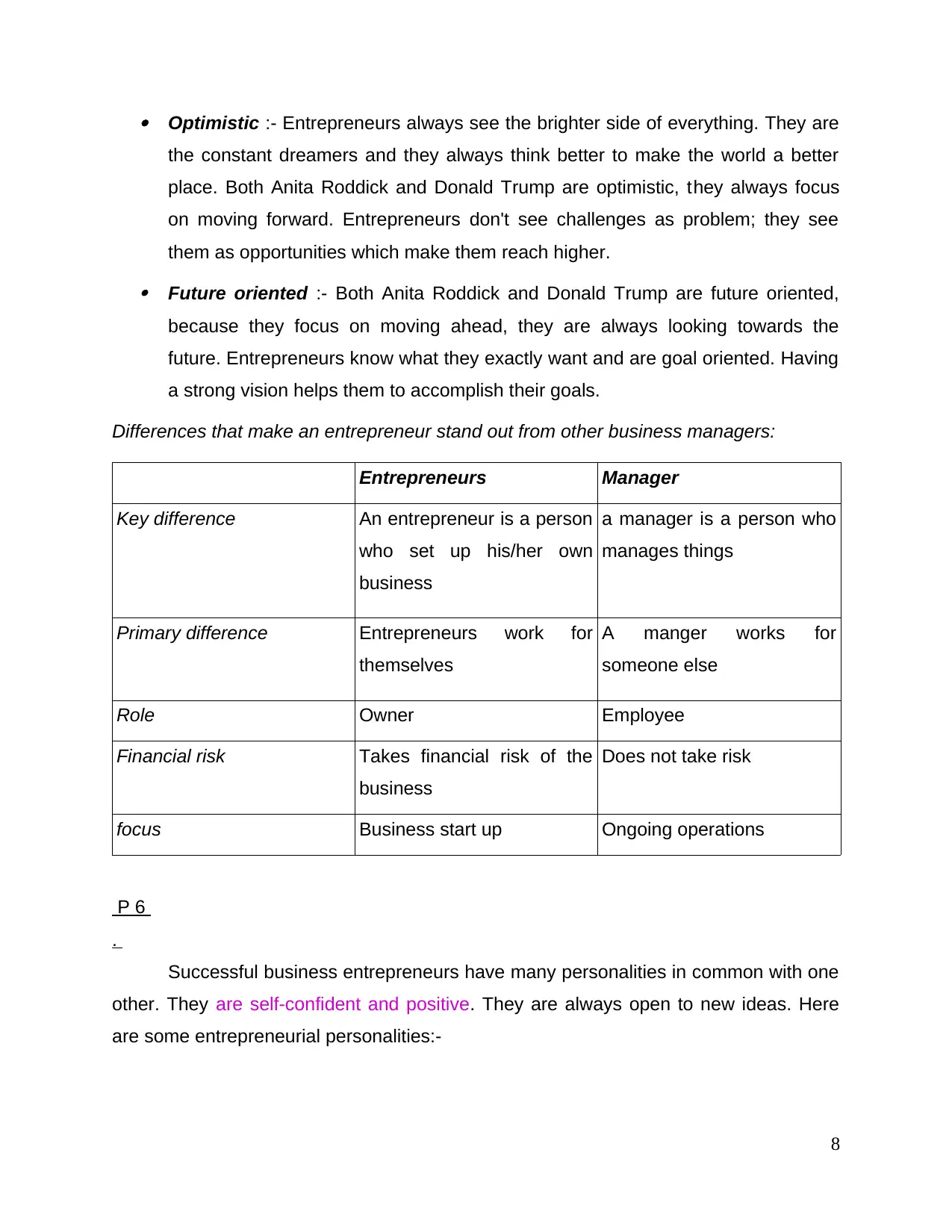
Optimistic :- Entrepreneurs always see the brighter side of everything. They are
the constant dreamers and they always think better to make the world a better
place. Both Anita Roddick and Donald Trump are optimistic, they always focus
on moving forward. Entrepreneurs don't see challenges as problem; they see
them as opportunities which make them reach higher. Future oriented :- Both Anita Roddick and Donald Trump are future oriented,
because they focus on moving ahead, they are always looking towards the
future. Entrepreneurs know what they exactly want and are goal oriented. Having
a strong vision helps them to accomplish their goals.
Differences that make an entrepreneur stand out from other business managers:
Entrepreneurs Manager
Key difference An entrepreneur is a person
who set up his/her own
business
a manager is a person who
manages things
Primary difference Entrepreneurs work for
themselves
A manger works for
someone else
Role Owner Employee
Financial risk Takes financial risk of the
business
Does not take risk
focus Business start up Ongoing operations
P 6
.
Successful business entrepreneurs have many personalities in common with one
other. They are self-confident and positive. They are always open to new ideas. Here
are some entrepreneurial personalities:-
8
the constant dreamers and they always think better to make the world a better
place. Both Anita Roddick and Donald Trump are optimistic, they always focus
on moving forward. Entrepreneurs don't see challenges as problem; they see
them as opportunities which make them reach higher. Future oriented :- Both Anita Roddick and Donald Trump are future oriented,
because they focus on moving ahead, they are always looking towards the
future. Entrepreneurs know what they exactly want and are goal oriented. Having
a strong vision helps them to accomplish their goals.
Differences that make an entrepreneur stand out from other business managers:
Entrepreneurs Manager
Key difference An entrepreneur is a person
who set up his/her own
business
a manager is a person who
manages things
Primary difference Entrepreneurs work for
themselves
A manger works for
someone else
Role Owner Employee
Financial risk Takes financial risk of the
business
Does not take risk
focus Business start up Ongoing operations
P 6
.
Successful business entrepreneurs have many personalities in common with one
other. They are self-confident and positive. They are always open to new ideas. Here
are some entrepreneurial personalities:-
8
Paraphrase This Document
Need a fresh take? Get an instant paraphrase of this document with our AI Paraphraser
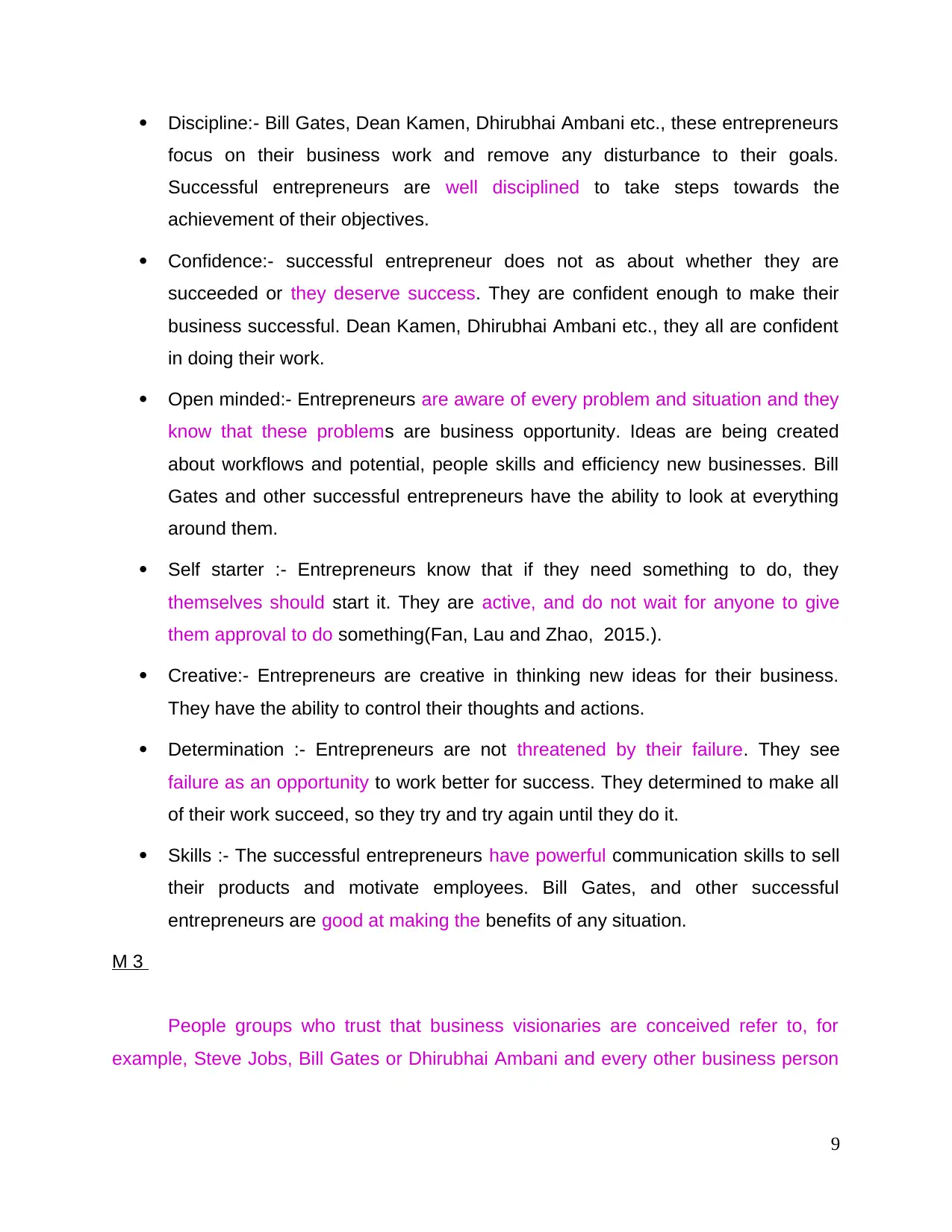
Discipline:- Bill Gates, Dean Kamen, Dhirubhai Ambani etc., these entrepreneurs
focus on their business work and remove any disturbance to their goals.
Successful entrepreneurs are well disciplined to take steps towards the
achievement of their objectives.
Confidence:- successful entrepreneur does not as about whether they are
succeeded or they deserve success. They are confident enough to make their
business successful. Dean Kamen, Dhirubhai Ambani etc., they all are confident
in doing their work.
Open minded:- Entrepreneurs are aware of every problem and situation and they
know that these problems are business opportunity. Ideas are being created
about workflows and potential, people skills and efficiency new businesses. Bill
Gates and other successful entrepreneurs have the ability to look at everything
around them.
Self starter :- Entrepreneurs know that if they need something to do, they
themselves should start it. They are active, and do not wait for anyone to give
them approval to do something(Fan, Lau and Zhao, 2015.).
Creative:- Entrepreneurs are creative in thinking new ideas for their business.
They have the ability to control their thoughts and actions.
Determination :- Entrepreneurs are not threatened by their failure. They see
failure as an opportunity to work better for success. They determined to make all
of their work succeed, so they try and try again until they do it.
Skills :- The successful entrepreneurs have powerful communication skills to sell
their products and motivate employees. Bill Gates, and other successful
entrepreneurs are good at making the benefits of any situation.
M 3
People groups who trust that business visionaries are conceived refer to, for
example, Steve Jobs, Bill Gates or Dhirubhai Ambani and every other business person
9
focus on their business work and remove any disturbance to their goals.
Successful entrepreneurs are well disciplined to take steps towards the
achievement of their objectives.
Confidence:- successful entrepreneur does not as about whether they are
succeeded or they deserve success. They are confident enough to make their
business successful. Dean Kamen, Dhirubhai Ambani etc., they all are confident
in doing their work.
Open minded:- Entrepreneurs are aware of every problem and situation and they
know that these problems are business opportunity. Ideas are being created
about workflows and potential, people skills and efficiency new businesses. Bill
Gates and other successful entrepreneurs have the ability to look at everything
around them.
Self starter :- Entrepreneurs know that if they need something to do, they
themselves should start it. They are active, and do not wait for anyone to give
them approval to do something(Fan, Lau and Zhao, 2015.).
Creative:- Entrepreneurs are creative in thinking new ideas for their business.
They have the ability to control their thoughts and actions.
Determination :- Entrepreneurs are not threatened by their failure. They see
failure as an opportunity to work better for success. They determined to make all
of their work succeed, so they try and try again until they do it.
Skills :- The successful entrepreneurs have powerful communication skills to sell
their products and motivate employees. Bill Gates, and other successful
entrepreneurs are good at making the benefits of any situation.
M 3
People groups who trust that business visionaries are conceived refer to, for
example, Steve Jobs, Bill Gates or Dhirubhai Ambani and every other business person
9
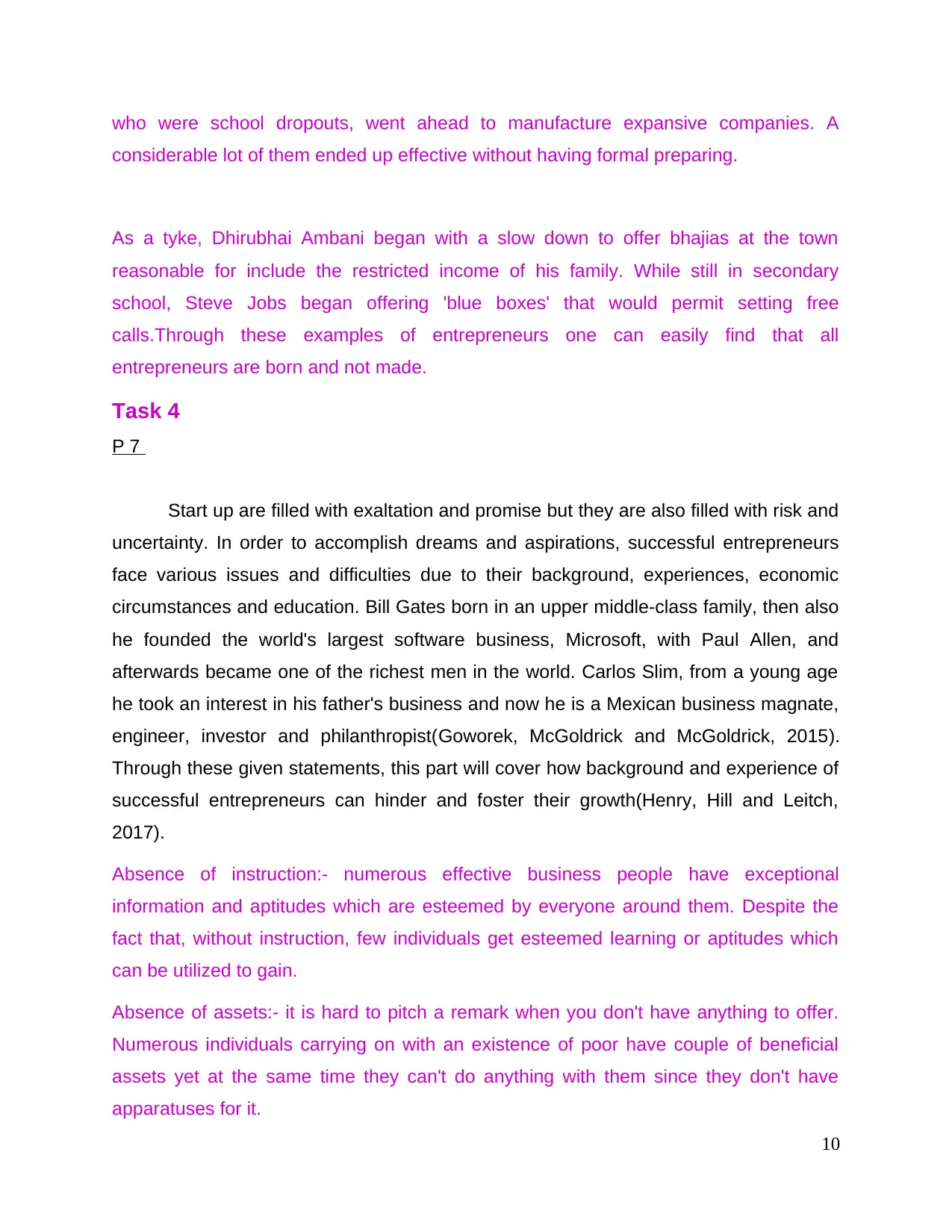
who were school dropouts, went ahead to manufacture expansive companies. A
considerable lot of them ended up effective without having formal preparing.
As a tyke, Dhirubhai Ambani began with a slow down to offer bhajias at the town
reasonable for include the restricted income of his family. While still in secondary
school, Steve Jobs began offering 'blue boxes' that would permit setting free
calls.Through these examples of entrepreneurs one can easily find that all
entrepreneurs are born and not made.
Task 4
P 7
Start up are filled with exaltation and promise but they are also filled with risk and
uncertainty. In order to accomplish dreams and aspirations, successful entrepreneurs
face various issues and difficulties due to their background, experiences, economic
circumstances and education. Bill Gates born in an upper middle-class family, then also
he founded the world's largest software business, Microsoft, with Paul Allen, and
afterwards became one of the richest men in the world. Carlos Slim, from a young age
he took an interest in his father's business and now he is a Mexican business magnate,
engineer, investor and philanthropist(Goworek, McGoldrick and McGoldrick, 2015).
Through these given statements, this part will cover how background and experience of
successful entrepreneurs can hinder and foster their growth(Henry, Hill and Leitch,
2017).
Absence of instruction:- numerous effective business people have exceptional
information and aptitudes which are esteemed by everyone around them. Despite the
fact that, without instruction, few individuals get esteemed learning or aptitudes which
can be utilized to gain.
Absence of assets:- it is hard to pitch a remark when you don't have anything to offer.
Numerous individuals carrying on with an existence of poor have couple of beneficial
assets yet at the same time they can't do anything with them since they don't have
apparatuses for it.
10
considerable lot of them ended up effective without having formal preparing.
As a tyke, Dhirubhai Ambani began with a slow down to offer bhajias at the town
reasonable for include the restricted income of his family. While still in secondary
school, Steve Jobs began offering 'blue boxes' that would permit setting free
calls.Through these examples of entrepreneurs one can easily find that all
entrepreneurs are born and not made.
Task 4
P 7
Start up are filled with exaltation and promise but they are also filled with risk and
uncertainty. In order to accomplish dreams and aspirations, successful entrepreneurs
face various issues and difficulties due to their background, experiences, economic
circumstances and education. Bill Gates born in an upper middle-class family, then also
he founded the world's largest software business, Microsoft, with Paul Allen, and
afterwards became one of the richest men in the world. Carlos Slim, from a young age
he took an interest in his father's business and now he is a Mexican business magnate,
engineer, investor and philanthropist(Goworek, McGoldrick and McGoldrick, 2015).
Through these given statements, this part will cover how background and experience of
successful entrepreneurs can hinder and foster their growth(Henry, Hill and Leitch,
2017).
Absence of instruction:- numerous effective business people have exceptional
information and aptitudes which are esteemed by everyone around them. Despite the
fact that, without instruction, few individuals get esteemed learning or aptitudes which
can be utilized to gain.
Absence of assets:- it is hard to pitch a remark when you don't have anything to offer.
Numerous individuals carrying on with an existence of poor have couple of beneficial
assets yet at the same time they can't do anything with them since they don't have
apparatuses for it.
10
⊘ This is a preview!⊘
Do you want full access?
Subscribe today to unlock all pages.

Trusted by 1+ million students worldwide
1 out of 15
Related Documents
Your All-in-One AI-Powered Toolkit for Academic Success.
+13062052269
info@desklib.com
Available 24*7 on WhatsApp / Email
![[object Object]](/_next/static/media/star-bottom.7253800d.svg)
Unlock your academic potential
Copyright © 2020–2026 A2Z Services. All Rights Reserved. Developed and managed by ZUCOL.



